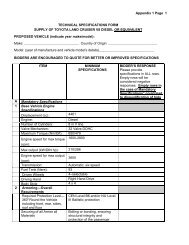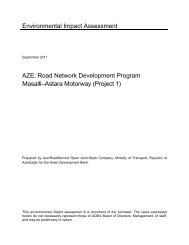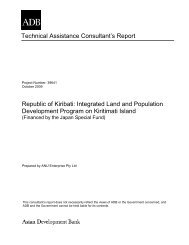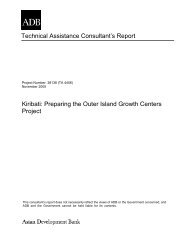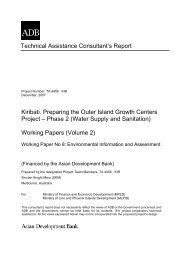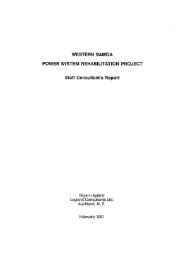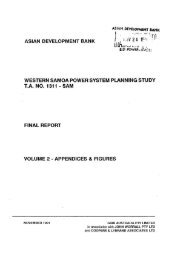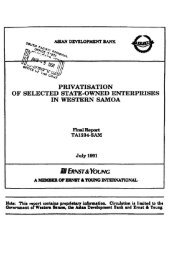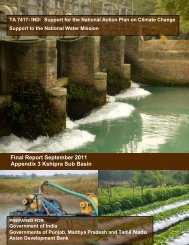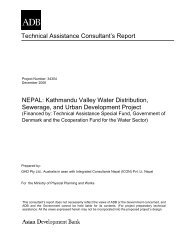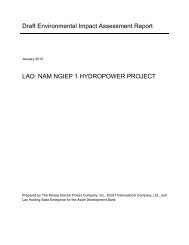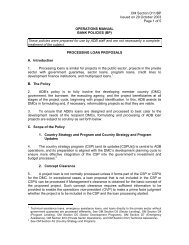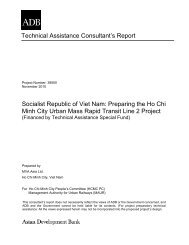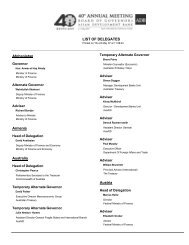Final Report - Asian Development Bank
Final Report - Asian Development Bank
Final Report - Asian Development Bank
Create successful ePaper yourself
Turn your PDF publications into a flip-book with our unique Google optimized e-Paper software.
Ho Chi Minh City Metro Rail System Project <strong>Final</strong> <strong>Report</strong> - Revised<br />
Management Authority for Urban Railways Chapter 2 – Project Context<br />
2.2 Socio-economic and Demographic Circumstances<br />
21. The last national population census in Vietnam was in 1999. For the purposes of the project<br />
estimates of population at base year (2007) and design years (2015, 2025) were made based on the<br />
projection data in the reports from HOUTRANS 1 and from the Study on the Adjustment of HCMC<br />
Master Plan 2 .<br />
22. In 2007 the estimated population of Ho Chi Minh City was over 6.5 million, growing at around<br />
2.9% per year. In addition, more than 2.5 million people live in the adjoining provinces of Lan An,<br />
Dong Nai and Binh Duong, totalling more than 9 million people in the Study Area. It is forecast that the<br />
Study Area population will reach over 13.8 million by 2025, with 10 million people in HCMC 3 . Most of<br />
the population growth is projected to happen in outer areas (the urban fringe, suburban and other<br />
outlying communities), while the inner core areas are projected either to decrease their populations (in<br />
high density areas) or increase moderately (in medium/low density areas). (See Figure 2.1-1 for a<br />
view of the estimated populations for 2007, 2015 and 2025 in the Study Area.)<br />
Figure 2.2-1: Population Estimates (in thousands) for 2007, 2015 and 2025 by Study Area<br />
Types<br />
4,500<br />
4,000<br />
3,500<br />
3,000<br />
2,500<br />
2,000<br />
1,500<br />
1,000<br />
500<br />
0<br />
1,400<br />
1,300<br />
2,400<br />
2,600<br />
3,000<br />
2,100 2,000<br />
2,900<br />
1,400 2,300 1,500 1,300 2,600<br />
Inner Core - high<br />
density<br />
Inner Core -<br />
med/low density<br />
3,200<br />
Urban Fringe Suburban Others<br />
23. In 2007, HCMC employed more than 3 million people and the Study Area almost 4.2 million<br />
people. By 2025, it is projected that HCMC will employ more than 5.5 million people and the Study<br />
Area more than 7.2 million people. While the employment growth is projected to spread throughout the<br />
Study Area ore evenly, the outer areas are still expected to generate most of the future employment<br />
(See Figure 2.2-2 for a view of the projected employment for 2007, 2015 and 2025 in the Study Area.)<br />
24. Viet Nam was among the world's fastest-growing economies with GDP growth rates above<br />
7.0% in 2001-2004 and above 8.0% in the last three years. In 2008, The GDP growth forecast for<br />
2008 is around 8.5%. HCMC is the largest city in Viet Nam and the primary centre of economic activity<br />
and, as such, its GDP growth has outpaced the national level growth: between 10% and 12% in 2001-<br />
2004 and more than 12% in 2004-2007. In the prospective future HCMC will continue to be the major<br />
centre of economic activity of the country.<br />
1<br />
The Study On Urban Transport Master Plan And Feasibility Study In Ho Chi Minh Metropolitan Area<br />
(HOUTRANS), JICA, ALMEC, 2004<br />
2<br />
The Study of the Adjustment of HCMC Master Plan up to 2025, Nikken Sekkei, Urban Planning Institute, April<br />
2007<br />
3<br />
For more details on socio-economic conditions the reader is referred technical documents prepared as part of<br />
the PPTA: Project Context and MRT Master Plan <strong>Report</strong>, December 2007, and HCMC Master Plan Ridership and<br />
Revenue Forecast Study, <strong>Final</strong> <strong>Report</strong>, January 2008.<br />
4,100<br />
Key:<br />
2007<br />
2015<br />
2025<br />
2-2



